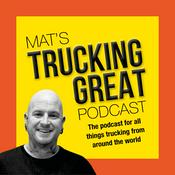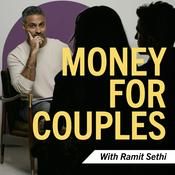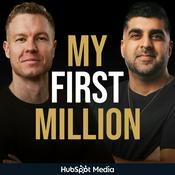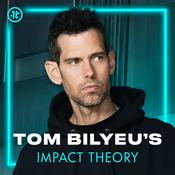57 episodes
Building BridgeGrades.org, a Rotten Tomatoes for Political Collaboration, with Brad Porteus
09/1/2026 | 28 mins.In this episode Colin interviews Brad Porteus, founder of BridgeGrades.org, a report card for Congress that grades politicians on how collaboratively or divisively they govern by compiling objective 3rd-party data. Bridge Grades offers citizen voters an alternative lens to evaluate and assess the performance of our United States legislators beyond ideology or party affiliation. Brad was motivated to create BridgeGrades.org because he believes toxic polarization and hyper-partisanship is holding us back. His multi-year quest is to build Bridge Grades into a transparent, open source, crowdsourced, and independently governed system protected from special interests. Durable and self-sustaining, Bridge Grades aspires to be a public utility that offers citizen voters an easy way to sort Congressional bridgers from dividers, creating incentives that can lead toward more collaborative governance for our common interests.
Learn more about BridgeGrades.org
Learn more about BradAvoiding Online ADR Scammers, with Arbitrator and Mediator Julie Walker (Ep. 54)
18/12/2025 | 19 mins.In this episode we speak with Julie M. Walker, an experienced arbitrator and mediator from Denver, Colorado, about a recent scam attempt she experienced and thwarted. We discuss how to recognize such scams, the best steps to take in response, and the growing prevalence of such schemes.
Learn more about Julie here: https://irelandstapleton.com/people/julie-m-walker/- In this episode, Colin Rule interviews Nelson Timken, founder of http://www.resolveourdispute.com, about mediating court referred cases and the specific challenges involved with handling litigated cases. This conversation builds on many of the points Nelson made in his mediate.com article Mastering Mediation Advocacy: Essential Skills for the Modern Litigator, co-authored with John Siffert.
About Nelson:
Nelson is an experienced neutral whose ADR practice is driven by a deep commitment to fair process, empowering parties, fostering understanding, and achieving results by perseverance. He values impartiality, integrity, and professionalism above financial gain. His approach to dispute resolution is to continue to work on a case until the parties are satisfied that every avenue of resolution has been explored. He has over 30 years of experience resolving cases in litigation, specialized industry knowledge, a high success rate, innovative approaches to problem-solving, and a commitment to client education. He offers a client-centric approach where self-determination is king.
Nelson's website is at https://www.timkendisputeresolution.com/ and https://www.resolveourdispute.com/
His mediate.com profile page (with a list of his articles) is at https://mediate.com/mediator-profile/Nelson-Edward-Timken/ A Mediation Model for Self Represented Parties, with Susan Hansen, Casey Holtz, and Michael Dwyer (Ep. 52)
03/9/2025 | 35 mins.In this episode, Colin Rule interviews Susan Hansen, Casey Holtz, and Michael Dwyer about their chapter in the book Family Dispute Resolution: Process and Practice. Their chapter (chapter four) is titled "A Mediation Model for Self-Represented Parties" and it covers the development of (and lessons learned from) the Family Mediation Center in Wisconsin, including the essential rule changes that opened the way for a major expansion of the role of mediation in the state.
This podcast is part of a continuing series interviewing authors from Family Dispute Resolution: Process and Practice.
About the book:
"Over the last 50 years family justice systems in the United States and elsewhere have evolved from a predominant adversarial approach focused on litigation to the significant integration of more collaborative, settlement-oriented approaches, especially mediation. In Family Dispute Resolution: Process and Practice some of the field's leading practitioners, researchers, teachers, and policymakers provide an overview of the modern family dispute resolution processes designed to help separating and divorcing parents make decisions about the future of their families.
Chapters in this book address the growth of divorce mediation and other specialized processes including parenting coordination, arbitration, child-inclusive mediation, and online dispute resolution. They describe how to work with families experiencing issues including domestic violence, high conflict, substance misuse, and the lack of legal representation. Case management initiatives and special issues, including social science research and conflicting standards of practice, are also explored.
Family Dispute Resolution provides a wide-ranging look at contemporary family dispute resolution processes and is essential reading for everyone interested in learning more about working with separating and divorcing families, including professionals, and law and graduate students."
Buy it here:
https://global.oup.com/academic/product/family-dispute-resolution-9780197545904
https://www.amazon.com/Family-Dispute-Resolution-Handbook/dp/0197545904- In this episode Colin interviews Anne-Marie Cade, an award winning Lawyer, Mediator, Family Dispute Resolution Practitioner, Conflict Resolution Specialist, Parenting Coordinator, Speaker, and Trainer. They speak about Anne-Marie's experience as a mayor, her work as a divorce coach, and her takeaways from her international study on Parenting Coordination.
After practicing law for over 15 years, Anne-Marie realized that what she was most interested in was relationships. She decided to begin training in mediation and coaching and established her own consultancy. She now works with corporate teams and local government to help them navigate conflict effectively and turn challenging confrontations into learning conversations. She also assists families who are experiencing a life crisis like divorce to resolve their disputes peacefully. She was awarded a Churchill Fellowship in 2020 to conduct research internationally in 16 cities in “Best Practice in Parenting Co-ordination” with a view to informing the implementation of the practice in Australia.
She is also an NLP Master Practitioner, a certified Divorce / Conflict coach, has training in Transformative Relationship Mediation, Brain Based Conversation and Coaching Skills (The Neuroleadership Institute), training in Applied Neuroscience and Brain Health and is also a Mental Health First Aider.
Anne-Marie was named Australian Mediator of the Year 2023 at the Australasian Law Awards and Conflict Coach of the Year in 2024.
More about Anne-Marie: https://annemariecade.com/about-me/
More about Divorce Coaching: https://www.divorcecoachesacademy.com/divorcecoach
An article from Anne-Marie at Mediate.com: https://mediate.com/why-words-matter-the-neuroscience-behind-careful-communication-in-local-government/
More Business podcasts
Trending Business podcasts
About The Mediate.com Podcast
The Mediate.com Podcast covers everything in the world of mediation: conflict resolution, best practices, ethics, technology, and business development. Episodes include interviews with experienced practitioners, discussions of practice dilemmas, and explorations of the future of the mediation field. Join us if you’re interested in mediation, just getting started as a mediator, or if you have decades of practice under your belt -- we’d love to have you as part of our community.
Podcast websiteListen to The Mediate.com Podcast, The Prof G Pod with Scott Galloway and many other podcasts from around the world with the radio.net app

Get the free radio.net app
- Stations and podcasts to bookmark
- Stream via Wi-Fi or Bluetooth
- Supports Carplay & Android Auto
- Many other app features
Get the free radio.net app
- Stations and podcasts to bookmark
- Stream via Wi-Fi or Bluetooth
- Supports Carplay & Android Auto
- Many other app features


The Mediate.com Podcast
Scan code,
download the app,
start listening.
download the app,
start listening.







































